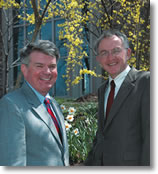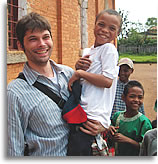 |
|
Photo © irishblue/istockphoto.com |
God’s desire is that the Gospel be proclaimed anywhere and everywhere, without limitations of geography, culture, or time. And so Christ told His disciples before He ascended, “You will be My witnesses in Jerusalem and in all Judea and Samaria, and to the end of the earth.” The Book of Acts and the remainder of the New Testament describe how God provided what He promised. The Holy Spirit empowered the Church, and the Gospel was proclaimed by the apostles and others to multitudes who were near and far—in Jerusalem, Judea, Samaria, and throughout Asia Minor.
Today, God continues to provide what He promised. His message of forgiveness and life through Jesus Christ is proclaimed across countless boundaries of geography, culture, and time. In the pages that follow, you will read how God is utilizing the seminaries of The Lutheran Church—Missouri Synod, your seminaries, to form pastors who proclaim the life-saving Gospel anywhere and everywhere—in ways that transcend geography, culture, and time.
Two pastors featured in the pages that follow are serving in parish ministry contexts that are very near and familiar to us, just like Jerusalem and Judea were for the apostles. Other seminary graduates featured here serve in contexts that are very distant and unfamiliar to many of us. Collectively, like thousands of other graduates from our seminaries, these men are taking the Gospel near and far—to the end of the earth.
Yet, something very interesting is happening concerning the “end of the earth.” It is coming to St. Louis and Fort Wayne in the form of scholars from distant lands who are enrolled in advanced-degree programs. Over the years, dozens of students have engaged in graduate study at our seminaries and have then served as seminary professors and leaders in Lutheran churches around the world. The depth and breadth of their theological knowledge has been greatly enhanced through their study at our two institutions.
The “end of the earth” is also coming to many cities throughout North America in the form of large groups of immigrants who are settling here. Your seminaries have responded to this opportunity by forming immigrant pastors through distance education to proclaim the Gospel faithfully among these populations, and to do so in their own languages. The “far” has come “near” to us!
As we celebrate the Ascension of our Lord on May 13, I join you in giving thanks to God for what He continues to accomplish through our excellent seminaries in Fort Wayne and St. Louis. Approximately 20,000 graduates have emerged from these seminaries over the past 170 years to take the Gospel to multitudes near and far. May the Holy Spirit continue to equip and empower our seminary graduates to proclaim the Gospel anywhere and everywhere, without limitations of geography, culture, or time—in Jerusalem, Judea, and Samaria, and to the end of the earth!
— Dr. Glen Thomas
Embracing the Challenge
Our seminaries are preparing pastors for a variety of ministries.
 |
|
Photo of Dr. Dale Meyer (left) and Dr. Dean O. Wenthe courtesy Concordia Seminary |
Recalling his days as a student at Concordia Seminary, St. Louis, Dr. Dale Meyer observes that it seemed that seminary formation was able to exist with a “one size fits all” approach.
“You know, you could turn out a pastor who could go into different situations, and it would work,” comments Meyer, who is now the seminary president. “It just doesn’t work as well any more. We are increasingly tailoring the offerings to prepare a student for that kind of ministry where he believes his gifts lie.”
As LCMS congregations, individually and collectively, heed Christ’s call to be His witnesses, they are finding that the mission may be as near as the ethnic settlement in their community. Meanwhile, they are ministering to members whose employment or military assignments take them around the globe.
That’s why the two LCMS seminaries address many dynamics as they form pastors and deaconesses for service in the Church.
“The classical model was to make sure they knew enough data, enough text, and enough language and history,” remarks Dr. Dean O. Wenthe, president of Concordia Theological Seminary, Fort Wayne. “Along with the fundamental theological knowledge, we are eager to bring social intelligence, emotional intelligence, and pastoral imagination as a habit of being for future pastors.”
Wenthe defines “social intelligence” as the capacity to relate to people in a variety of situations, whether urban, suburban, or rural. “Emotional intelligence” involves skills to keep personally healthy, as well as an ability to express caring concern toward others. He describes “pastoral imagination” as the capacity to position the Gospel in a way that attracts people of a particular culture to consider Christ and His gifts.
The St. Louis seminary currently offers students a mission track, and Meyer says it is considering a rural-ministry track, as well as additional courses for men considering urban ministry. Also, the seminary is planning new courses so that future pastors can gain basic knowledge of counseling, accounting, and business principles.
During his days as a student, Wenthe says it was just assumed that the Church was an important part of the social matrix—a privilege the Church no longer enjoys.
“If there is a place where the Church can be renewed with fresh, dynamic thinking that’s not just technique, butconceptually rich and inviting and practical at the same time, I think the two seminaries are the place to invest and to send the brightest and best young men and women to serve the Church in this totally new environment,” Wenthe says.
Both seminaries have incorporated cross-cultural experiences for their students. It may be visits to missions in South Africa, Madagascar, Haiti, or Russia. Students also have opportunities to follow pastors who serve in urban or ethnically diverse areas of the United States. Meyer quotes a student who said his experience with diverse ministries in Southern California was “truly life changing.” Wenthe adds that students “come back different people because they see the Church in other cultures and rejoice in the common faith.”
Both presidents underscore that the seminaries serve beyond preparation of future pastors. The faculties share their expertise in presentations to district and circuit meetings and sit as members of LCMS boards and commissions. Technology provides the capability to offer resources—ranging from Greek courses for credit to presentations at theological symposiums or discussions of Sunday Scripture readings—via the Internet.
Via iTunes U, a service of Apple Computer, the St. Louis seminary counts some 12,000 daily downloads of courses and other resources in audio and video formats. The Fort Wayne seminary offers resources, including Greek for credit, from its Web site and is developing new materials incorporating art, music, and lecture for Bible classes and other teaching. (For more information, see the seminary Web sites: www.csl.edu and www.ctsfw.edu.)
“The value of the seminaries to the Church today is greater than ever because the Church assembled theological minds on the two seminary campuses,” Meyer says. “The seminaries are here to help share both the pastors and resources with the Church.”
— Roland Lovstad
—
…and the Church Can Help!
 |
|
Madagascar is among the places that Concordia Theological Seminary students participate in cross-cultural and mission activities.Photo courtesy
|
“The greatest gift that the church could give us would be their gifted young men and women,” observes Dr. Dean Wenthe, president of Concordia Theological Seminary, Fort Wayne.
That said, the seminaries continue to depend on the financial support of the people and congregations of the Synod. Due to declining national contributions, the Synod is able to supply only about one percent of the seminaries’ operating bud gets. In addition to tuition and grants, the seminaries must raise additional funds.
“There is still a perception that we are taken care of rather generously,” Wenthe remarks. “So much of Dr. Meyer’s and my work, as presidents, is securing funding.”
Meyer adds: “The seminaries just can’t do it alone, so we are grateful to the donors who give.” He cites Res. 4-09A from the last LCMS convention that calls on the wider church to assume the challenge of funding seminary education. He expresses appreciation for the growing number of congregations that include the seminaries in their budgets.
Meyer also notes how the church helps in providing students with field experiences in traditional and cross-cultural ministries, as well as vicarages for a year of intensive experience. He adds, “The initial calls of our graduates are into congregations, and many play a valuable role in helping to take this freshly minted pastor and beginning the job of seasoning him.”
— Roland Lovstad
—
About the Authors:
Roland Lovstad is an editor-at-large for The Lutheran Witness and a member of Immanuel Lutheran Church, Perryville, Mo.
Dr. Glen Thomas is the executive director of the LCMS Board for Pastoral Education.





